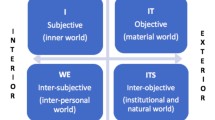Abstract
Why and how can mindfulness practices have a positive, measurable impact on individual and organizational change within a school? This chapter considers this question by looking closely at two established models of transformational change that have been used in educational settings. It then engages the thought experiment: How might mindfulness strengthen the recommended interventions? After specifying a definition of mindfulness practices, the author examines the Immunity to Change framework of Robert Kegan and Lisa Lahey and the Constructivist Listening framework of Julian Weissglass and describes how the introduction of mindfulness practices could accelerate the process of transformation prescribed in each model. The chapter concludes with the suggestion that mindfulness can be effective in these two instances because both models of change involve parallel processes of organizational and personal transformation, and parallel processes of cognitive and emotional development. When change processes require that individuals within organizations alter their mental models and their behaviors as well as take responsibility for self-monitoring progress and self-regulating emotional responses, mindfulness can play a crucial role in bringing about the desired transformation. The chapter concludes by recommending the testing of this hypothesis with an educational change process that has these characteristics.
Access this chapter
Tax calculation will be finalised at checkout
Purchases are for personal use only
Similar content being viewed by others
Notes
- 1.
The forms of emotional release that Weissglass names include: crying, tantruming, trembling, laughing, yawning, excessive talking, and perspiration (1998).
- 2.
A variation of this ongoing dyadic support is found in the Focusing model of Eugene Gendlin (Gendlin, 1988). Developed to support personal change, its distinguishing characteristic is its encouragement of attention to somatic clues as an indication of the need for curiosity about and processing of experience and feelings. David Rome (2014) explores this potential in his book, Your Body Knows the Answer: Using Your Felt Sense to Solve Problems, Effect Change and Liberate Creativity.
- 3.
The internal supports provided by mindfulness are also beneficial to individuals who are engaged in therapeutic processes, whose “aha” moments are not enough to translate into daily behavior change.
References
Chodron, P. (1997). When things fall apart: Heart advice for difficult times. Boston, MA: Shambhala.
Chodron, P. (2007). Practicing peace in times of war. Boston, MA: Shambhala.
Didonna, F. (Ed.). (2009). Clinical handbook of mindfulness. New York, NY: Springer.
Ferguson, G. (2010). Natural wakefulness: Discovering the wisdom we were born with. Boston, MA: Shambhala.
Gendlin, E. (1988). Focusing-oriented psycho-therapy: A manual of the experiential method. New York, NY: Guilford.
Kabat-Zinn, J. (2013). Full catastrophe living: Using the wisdom of your body and mind to face stress. New York, NY: Bantam.
Kegan, R. (1998). In over our heads: The mental demands of modern life. Cambridge, MA: Harvard.
Kegan, R., & Lahey, L. (2001). The real reason people won’t change. Harvard Business Review, 79(10), 85–92. Reprint RO110E.
Kegan, R., & Lahey, L. (2009). Immunity to change: How to overcome it and unlock the potential in yourself and your organization. Cambridge, MA: Harvard.
Kornfield, J. (1993). A path with heart: A guide through the perils and promises of spiritual life. New York, NY: Bantam.
Mindfulnet.org. (2014). The neuroscience of mindfulness. Retrieved from http://www.mindfulnet.org/page25.htm
Mipham, S. (2004). Turning the mind into an ally. Boston, MA: Shambhala.
Rome, D. (2014). Your body knows the answer: Using your felt sense to solve problems, effect change and liberate creativity. Boston, MA: Shambhala.
Seppala, E. (2014). 20-scientific-reasons-to-start-meditating-today. Retrieved from http://www.emmaseppala.com/
Suzuki, S. (1999). Zen mind, beginner’s mind. Boston, MA: Weatherill.
Wagner, T., Kegan, R., Lahey, L., & Lemons, R. W. (2005). Change leadership: A practical guide to transforming our schools. San Francisco, CA: Jossey-Bass.
Weissglass, J. (1998). Ripples of hope: Building relationships for educational change. Santa Barbara, CA: University of California Center for Educational Change in Mathematics and Science.
Author information
Authors and Affiliations
Corresponding author
Editor information
Editors and Affiliations
Rights and permissions
Copyright information
© 2016 Springer-Verlag New York
About this chapter
Cite this chapter
Wilensky, R. (2016). Mindfulness and Organizational Change. In: Schonert-Reichl, K., Roeser, R. (eds) Handbook of Mindfulness in Education. Mindfulness in Behavioral Health. Springer, New York, NY. https://doi.org/10.1007/978-1-4939-3506-2_15
Download citation
DOI: https://doi.org/10.1007/978-1-4939-3506-2_15
Published:
Publisher Name: Springer, New York, NY
Print ISBN: 978-1-4939-3504-8
Online ISBN: 978-1-4939-3506-2
eBook Packages: Behavioral Science and PsychologyBehavioral Science and Psychology (R0)



